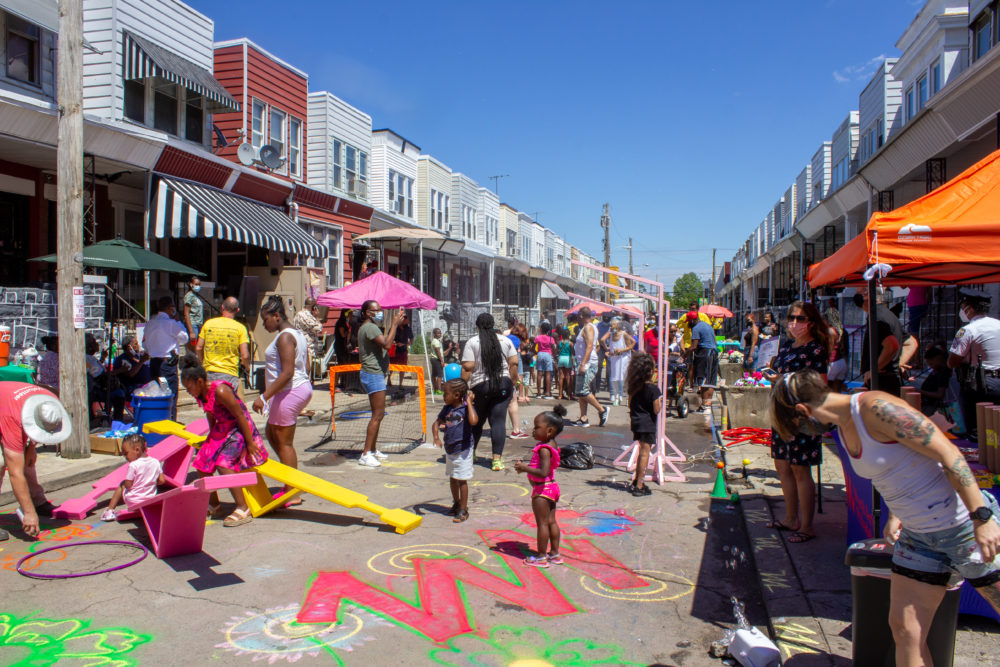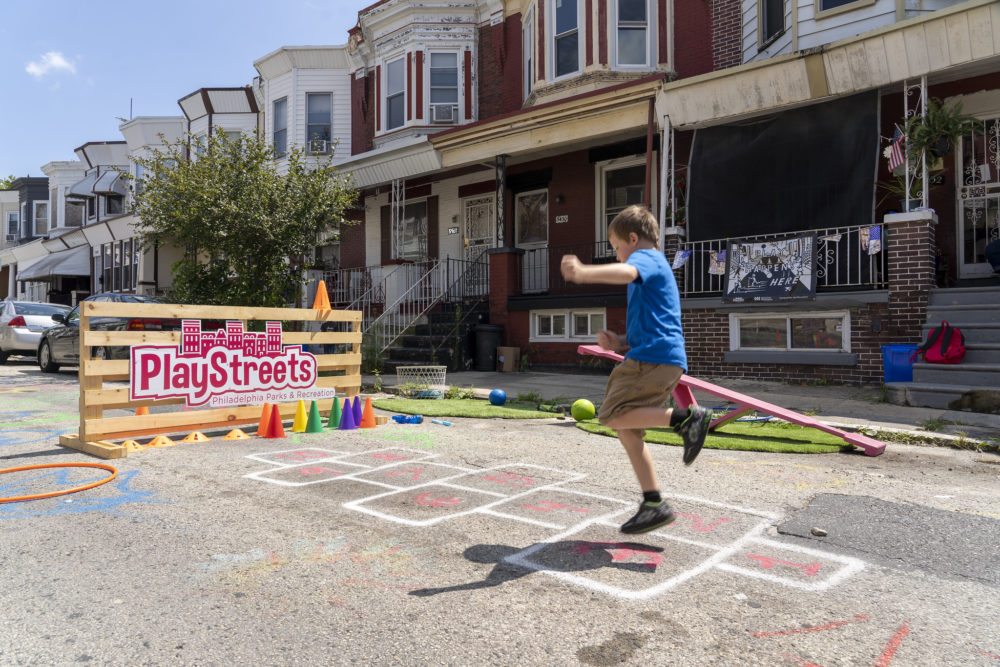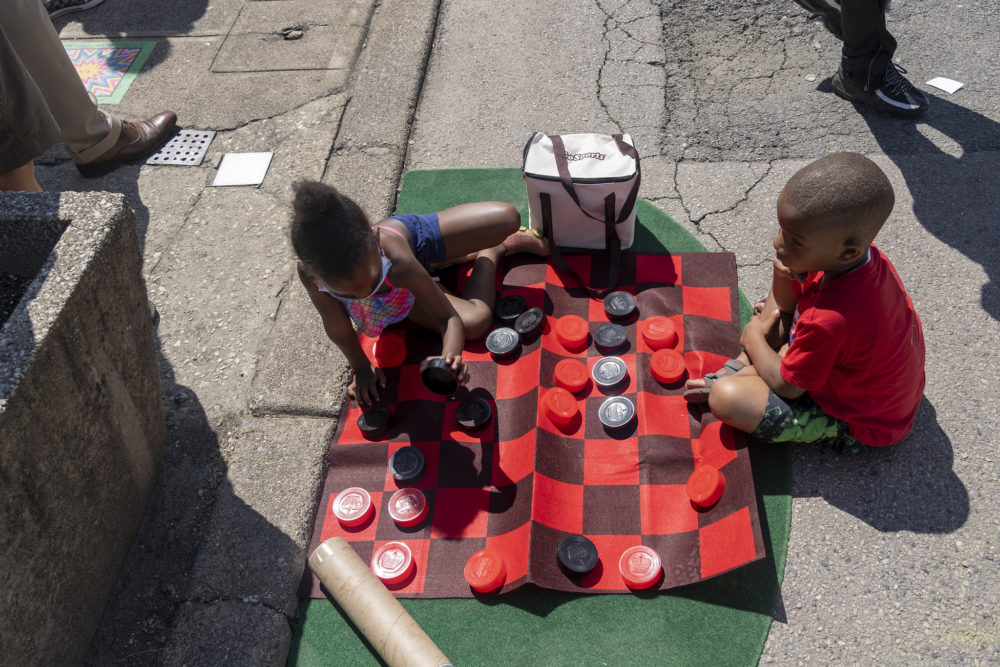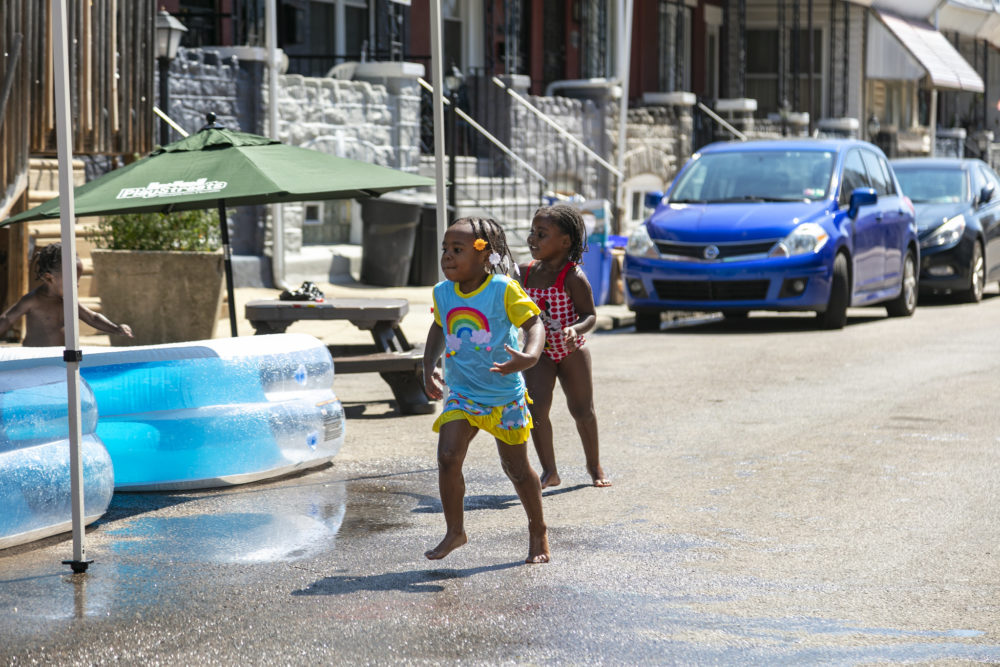This summer, select cities across the country will block traffic to “play streets,” creating child-friendly zones in urban neighborhoods that lack parks and other public amenities.
In some cities, play streets are one-time events. Others, like Philadelphia, block off hundreds of streets every day all summer long and have for decades.
 During the pandemic, Philadelphia expanded the program to create a summer camp atmosphere in some of the city’s poorest neighborhoods.
During the pandemic, Philadelphia expanded the program to create a summer camp atmosphere in some of the city’s poorest neighborhoods.
City officials now hope to make that expansion permanent by continuing to partner with nonprofits to bring reading, arts, crafts and sports directly to children’s front doors.
The play street movement seeks to encourage outdoor play by creating safe and accessible public spaces for children right where they live. While kids in more affluent families go on vacation or attend summer camps and other enrichment programs, kids in communities with high unemployment and crime may lack those activities or even safe places to be during the day.
“It’s absolutely an equity endeavor,” said Kathryn Ott Lovell, commissioner of Philadelphia Parks & Recreation, which runs the city’s Playstreets program.

Joe O'Conner/Philadelphia Parks & Recreation
Every year Philadelphia blocks of streets to cars for children to play.
Fifty streets chosen based on crime and poverty indicators — as well as heat vulnerability — are getting play equipment and visits from nonprofits bringing arts and sports activities. Ten of the 50 are designated Streets of Wonder, which get playful learning activities brought by staff from the Free Library of Philadelphia and Fab Youth Philly.
“It feels right to meet these kids where they are,” Ott Lovel said.
One of the earliest official play streets was created in New York City in 1914 by the police commissioner with the goal of keeping kids out of trouble. Since then, play streets have gained support globally, with play street initiatives in Australia, United Kingdom, Chile, Austria, Canada and Denmark.
Paul Tranter, a geographer in the School of Science at UNSW Canberra, Australia, said city streets were once seen as a public space for children, pedestrians and cyclists, but were gradually given over to cars.
He said Playstreets offer children greater freedom of movement and a chance for unstructured play in a community setting.
“In many nations, children now have less access to unstructured play than they did a generation or more ago,” Tranter said.
Plugging nonprofits into Playstreets
Philadelphia Playstreets was started in the 1960s to create sites where federally-funded summer meals could be delivered to children. The long-running program relies on residents who volunteer to be block supervisors. They rope off the street every day and bring children together to play and have a meal.

Ken McFarlane and Sahar Coston-Hardy/Philadelphia Parks & Recreation
A Philadelphia Playstreets hopscoth game.
For the city, the central focus of the program has always been meal distribution. The residents who supervise play say that’s important.
“It’s a lot of grandmothers around here raising their grandchildren on a fixed income,” one unnamed block supervisor told the journalism organization Resolve Philly, which collected feedback from supervisors last fall.
“I was very proud to be a part of helping them feed their grandchildren,” they said.
The program helps families with kids in a city that has one of the highest poverty rates in the U.S., with about a quarter of residents living under the poverty threshold. The highest rates are among Hispanic and Black residents.
Last summer, the COVID-19 pandemic forced the Department of Parks & Recreation, which also suffered a budget cut, to rethink the play street program..
Summer meals remained a core part of the program, but the department also partnered with local and national nonprofits to bring additional resources into the play streets. Despite budget cuts, the department was able to raise $600,000 from private donors by joining forces with the YMCA of Philadelphia.
Art, sports and cooling equipment, including misting fans and shade tents, were delivered to the blocked-off streets.
“We ordered something like 20,000 Super Soakers,” Ott Lovell said.
Staff from the Free Library of Philadelphia and the youth development organization Fab Youth Philly brought playful learning activities such as math and word games. Fab Philly also hired local teens as “play captains,” or supervisors, for $9 an hour.

Ken McFarlane and Sahar Coston-Hardy/Philadelphia Parks & Recreation
A big game of checkers in the Philadelphia Playstreets program.
Yamirah Simon, 16, got her first job through the program last year and will return this summer. She recalled the excited shouts of children when they saw her pulling up with a metal shopping cart of games and books: “The play people are here! The play people are here!”
Another teen, Ta’leay Brisset, said the program taught her how to work with young children and brought her in contact with adult mentors.
Last summer’s experience also has led the department to think differently about expanding services outside of city recreation centers and partnering with nonprofit youth organizations.
“What COVID taught us was to collaborate,” Ott Lovell said.
Nevertheless, it’s unclear how the collaborations will continue next year, she said. The department is exploring ways to continue working with partners and sponsors to make the enhancements a regular part of its summer youth programming.
But Tranter, the geographer, said play streets don’t need organized activities to be beneficial.
“Bringing books and educational games into play streets is an example of how the value of unstructured play may not be appreciated for the tremendous benefits it provides,” he said.






























